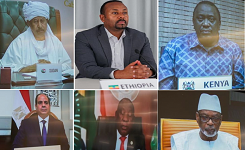The African Union (AU) has taken Ethiopia’s Nile dam dispute with Sudan and Egypt from the United nations Security Council holding an extraordinary meeting on Friday.
With its principle of “African solution for African matters”, AU held an Extraordinary Meeting of Bureau of African Union Assembly on Friday involving all the three countries which are members of the Union. The extraordinary meeting that focused on the first filling and annual operation of the Great Ethiopian Renaissance Dam (GERD), was connived by South African President and African Union Chair Cyril Ramaphosa, with the participation of Heads of States of Ethiopia, Sudan, Egypt and Members of Assembly Bureau, according to the press statement shared on twitter by Prime Minister Abiy Ahmed of Ethiopia.
“The leaders underscored the Nile and the GERD are African issues that must be given African solutions,” he twitted, indicating that the extraordinary meeting has noted “to notify the United Nations Security Council that the African Union is seized of the matter.”
The statement indicated that during the AU’s virtual extraordinary meeting the Heads of Sates of Ethiopia, Sudan and Egypt provided statement on the status of the negotiations.
“The meeting set directions on the way forward. Accordingly the three countries have agreed to conclude the negotiation and try to reach an agreement within the next two weeks,” according to Abiy’s statement.
The statement also noted that Ethiopia is scheduled to begin filling the GERD within two weeks, during which the remaining construction work will continue. It is in this period, that the three countries “have agreed to reach a final agreement on few pending matters.”
“The extraordinary meeting noted to notify the United Nations Security Council that the African Union is seized of the matter. It also instructed the African Union and members of the Bureau to provide technical support for the negotiations and urged Ethiopia, Sudan and Egypt to cease unnecessary media escalation,” the statement said.
AU’s intervention in the dispute came after Egypt filed its complain to the UN Security Council recently to stop Ethiopia from filling water GERD before the three countries reach an agreement. Latest media report shows that Egypt’s move was highly backed by the United States, which is one of the members of the UN Security Council.
The UN Security was expected to hold an open meeting on the issue on Friday (the same day the AU held the extraordinary meeting) or on Monday, according to Addis Standard report, which used inside sources.
It is believed that the decision of the AU to take such African matters into its hand will minimize the interference of global powers, which in one way or another benefit from the disputes in the continent.
Since Ethiopia began the construction of GERD nine years ago, Egypt has been claiming that the project will reduce its historical water share from the Nile River. Ethiopia, from where 86 percent of the Nile water has been originating, has argued that it has “natural right” to utilize the water without causing severe damage to the down stream countries – Sudan and Egypt.
The remaining 14 percent of the water of the Nile originates from the other Nile basin countries, which includes, Uganda, Tanzania, Kenya, Democratic Republic of Congo, Rwanda, Burundi, South Sudan and Eritrea. With the aim of ensuring fair and equitable use of the Nile river by all Nile basin countries, Ethiopia and the other countries in the Basin have been in discussion, which led to the signing of the Nile basin Cooperative Framework Agreement (CFA).
The 11 Nile basin countries have been negotiating to come up with internationally binding crossbowman river, which ultimately targets establishing Nile Commission, which will legalize a fair and equitable use of the Nile water by all Nine riparian countries. After years of discussion, in 2010, Four member countries (Ethiopia, Rwanda, Tanzania, and Uganda) sign the opened CFA in Entebbe, Uganda, while Egypt and Sudan, which do not contribute a single gallon of water to the Nile River but have been using all the water rejected.
It is expected that if two more Nile basin countries have managed to ratify the CFA, the use of water of the Nile River will end the disputes over the use the water of the Nile River.
